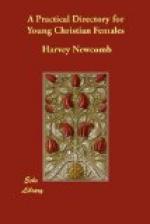intermarrying of the righteous with the wicked was
the principal cause of the general corruption of the
inhabitants of the old world, which provoked God to
destroy them with the flood. Abraham, the father
of the faithful, was careful that Isaac, the son of
promise, should not take a wife from among the heathen.
The same precaution was taken by Isaac and Rebecca,
in relation to Jacob. The children of Israel
were also expressly forbidden to make marriages with
the heathen, lest they should be turned away from
the Lord, to the worship of idols. And we see
a mournful example of the influence of such unholy
connections in the case of Solomon. Although
he had been so zealous in the service of the Lord
as to build him a temple—although he had
even been inspired to write portions of the Holy Scriptures—yet
his strange wives turned away his heart, and persuaded
him to worship idols. Although we are now under
a different dispensation, yet principles remain
the same. The union of a heathen and a Jew was,
as to its effect on a pious mind, substantially the
same as the union of a believer and an unbeliever;
and the former would be no more likely to be drawn
away from God by it than the latter. Hence we
find the same principle recognized in the New Testament.
The apostle Paul, speaking of the woman, says, “If
her husband be dead, she is at liberty to be married
to whom she will, only in the Lord.” The
phrase in the Lord, denotes being a true Christian;
as will appear from other passages where the same
form of expression is used. “If any man
be in Christ, he is a new creature.”
It is plainly implied, then, in this qualifying phrase,
that it is unlawful for a Christian to marry an unbeliever.
The same doctrine is also taught by the same apostle
in another place. “Be not ye, therefore,
unequally yoked with unbelievers.” In this
passage the apostle lays down a general principle;
which applies to all intimate associations with unbelievers.
And what connection could be more intimate than this?
I conclude, therefore, that it is contrary both to
reason and Scripture for a Christian to marry an impenitent
sinner. And, in this respect, look not only for
an outward profession, but for evidence of deep-toned
and devoted piety. The are many professors of
religion who show very few signs of spiritual life.
And there are doubtless many that make loud professions
of religious experience, who know nothing of the power
of godliness. Look for a person who makes religion
the chief concern of his life; who is determined to
live for God, and not for himself. Make this the
test. Worldly-minded professors of religion are
worse associates than those who make no profession.
They exert a more withering influence upon the soul.




